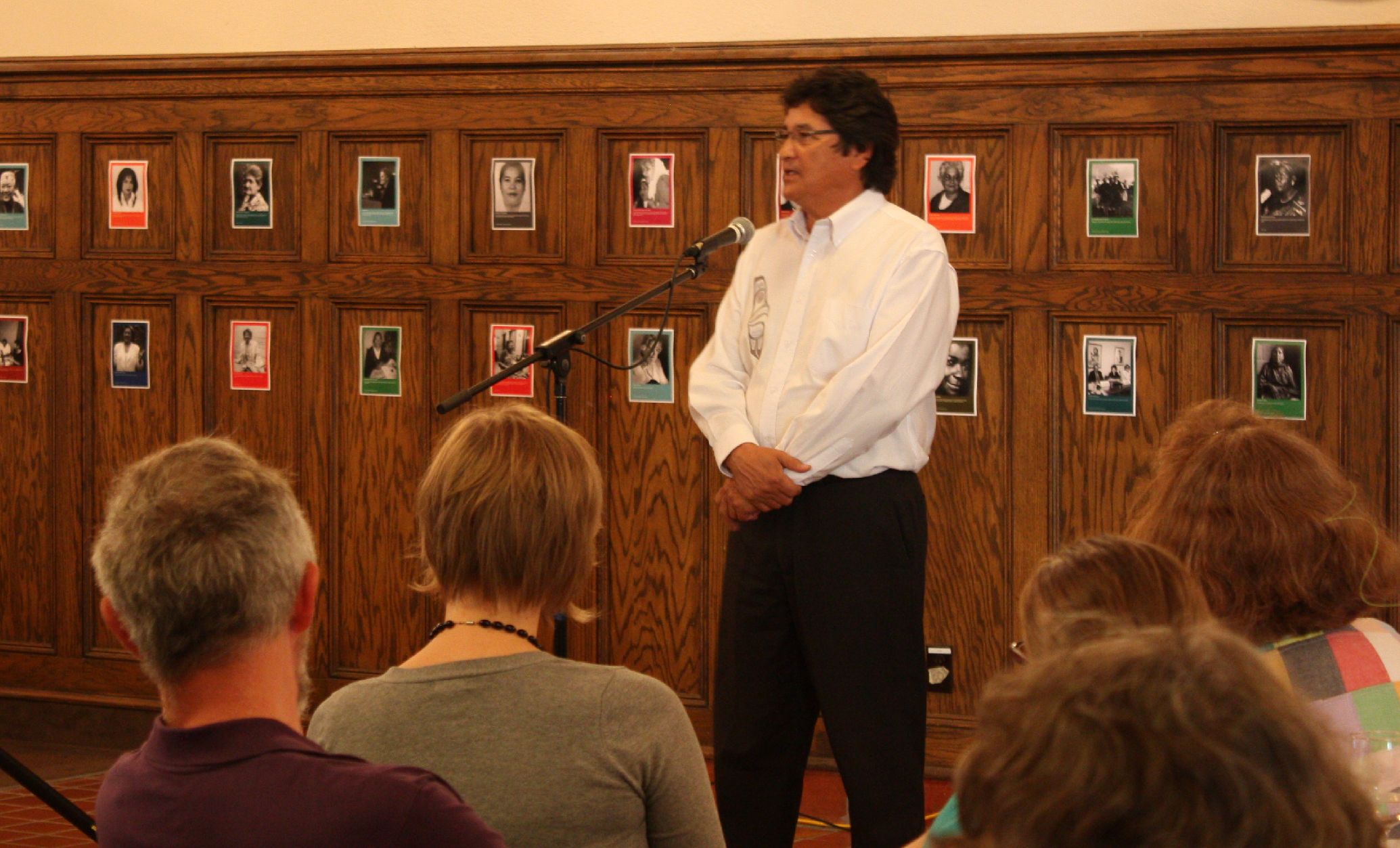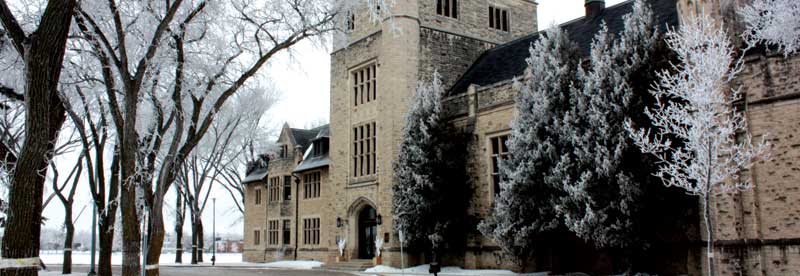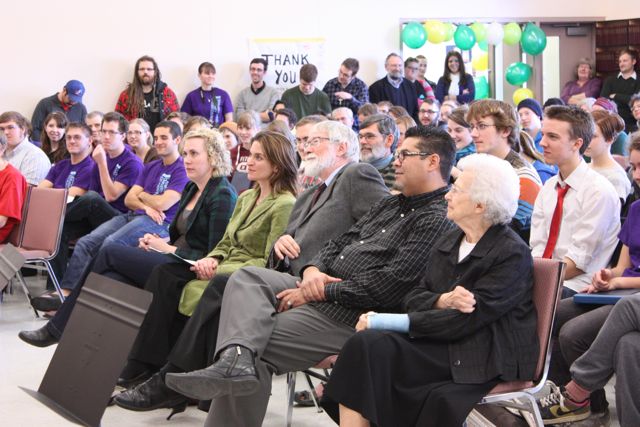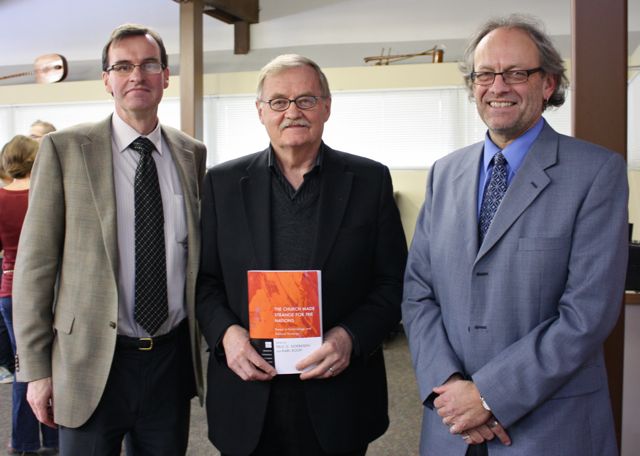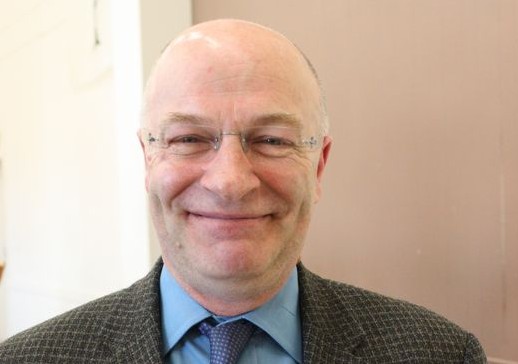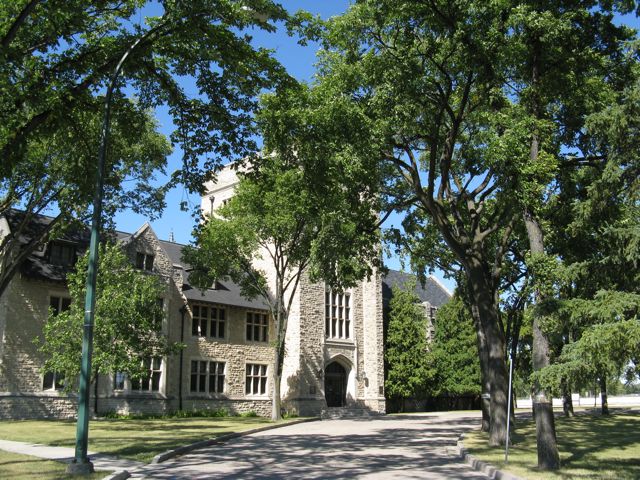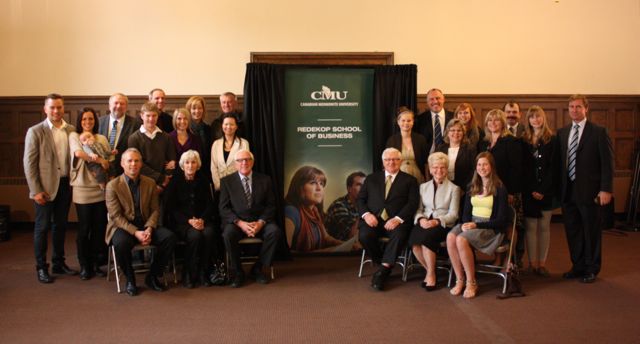For part-time students, mature students working towards a degree, and for members of the community who want to study a course of personal or professional interest to them, evening courses offer opportunities to build on personal learning and professional career goals.
“Many students appreciate the option of studying in the evening, and for part-time students in particular, flexibility in scheduling courses is a necessity, due to employment hours, child-care arrangements, or other commitments,” says CMU Registrar Wesley Toews. “We are pleased to offer a great selection of courses this next term, and it is always gratifying to see members of the community coming out to study subjects in which they have developed a keen interest, or courses they feel would prepare them more adequately for the work they do.”
Evening course offerings, available for credit or audit, include: five courses exploring the Bible and theology, including Issues in Youth Ministry trends; business courses for those working towards a BBA degree or business major or for personal and professional development; two courses in CMU’s Communications and Media stream; a course for those interested in gaining expertise in Disaster Recovery Studies; an English course relating to South African literature on Apartheid and Reconciliation; a music course on conducting, and another on the psychology of music for those interested in music therapy, and two psychology classes, one of which is also a business program credit.
CMU Evening Courses – January-April 2012
BTS-2310 Issues in Youth Ministry (John Berard)
BTS-3520 Sixteenth-Century Reformations (Paul Doerksen)
BTS-4495 Practice and Theology of Mission (Titus Guenther)
BTS-5080 Theology of Isaiah (Pierre Gilbert)�
BTS-5700 The Church in Ecumenical Perspective (Karl Koop)
BUSI-2050 Fundamentals of Marketing (Andrea Martens)
BUSI-2030 Management and Organizational Theory (Ingrid Peters-Fransen)
COMM-3030 Public Relations (Paula Havixbeck)
COMM-2000 New Media (David Balzer)
DRS/IDS-2171 Crisis, Humanitarian Aid, and Disaster Recovery (Bruce Guenther)
ENGL-3950 South African Literature: From Apartheid to Reconciliation (Franklin Hyde)
MUSC-4170 Band and Orchestral Techniques (Virginia Helmar)
MUSC-3830 Psychology of Music (Jennifer Lin)
PSYC-2410 Counselling Techniques (Lynda Loewen)
PSYC/BUSI-3000 Organizational Leadership (Vonda Plett)
CMU Evening Courses – January-April 2012
6:00pm – 8:45pm
Monday
BTS-5080 Theology of Isaiah (Pierre Gilbert)
The book of Isaiah provides an awesome picture of the person of God and, some say, the clearest and most incisive statement of monotheism in the Old Testament. But, as lofty a picture of God as it may provide, the book presents an equally dismal portrait of Israel and by extension of human nature. The book of Isaiah is not, however, a simple exercise in hopelessness. It is first and foremost a book of hope. Isaianic hope is rooted in two ideas: 1) the loving, perseverant and compassionate nature of a God who has a project for Israel and all of humanity; 2) the provision of a means of redemption that ultimately derives from God’s initiative and finds its ultimate fulfillment in the incarnation of Christ and the full revelation of the Kingdom of God. In this course, we will examine the book of Isaiah in terms of 1) the overall theme in a canonical perspective; 2) the relevant historical context(s); 3) its contribution to biblical theology and its relevance for the Church today. Prerequisite: This is a course for graduate students. Persons who have completed a baccalaureate degree are welcome to apply for admission to this course as Continuing Education students.
BUSI-2050 Fundamentals of Marketing (Andrea Martens)
Analysis of marketing problems, emphasizing various alternatives available for achieving economic efficiency in the distribution process; public policy with respect to marketing.
BUSI/ECON-3500 International Business and Economics (Craig Martin)
This course examines economic theory and its application to business in an international context. The course will address social, environmental, ethical and economic issues associated with international business, including the interaction between government and business. Prerequisites: Two of ECON-1000/3, ECON-1010/3, or BUSI-1000/3.
ENGL-3950 South African Literature: From Apartheid to Reconciliation (Franklin Hyde)
The aim of this course is to impart a broad outline of South African literature since 1945 in its political, cultural, and economic contexts. The course will focus primarily on novels and film adaptations, with some diversion into the genres of reportage and documentary film. Texts are drawn from all the major population groups of South Africa, from both the apartheid and post-apartheid eras. Reading this literature as the product of a specific historical and cultural location will introduce students to some of the major ideas of postcolonial and trauma theory. Prerequisites: ENGL-1010/3 and1020/3 or permission of the instructor.
PSYC-2410 Counselling Techniques (Lynda Loewen)
Explores the formation of helping relationships, using the Human Relations Model of Helping, with a focus on self-understanding as a basis for effective communication and understanding of human interactions. Topics will also include helping skills, helper characteristics, communication skills, barriers to communication, relationship establishment, ethics and values clarification. Prerequisite: PSYC-2400.
Tuesday
BTS-2310 Issues in Youth Ministry (John Berard)
The post-modern world creates challenges and opportunities for the church’s ministry to youth. Pressures and crises that put youth at risk will be identified and the issues with which many struggle will be explored with a goal of finding ministry responses that can lead to healthy growth and development.
BTS-4495 Practice and Theology of Mission (Titus Guenther)
This course examines the historical and theological roots, as well as the biblical understanding and practice of mission and evangelism. It explores the challenges of communicating the Good News of the Christian faith in contemporary society. It reflects on the nature of the church and its calling to be a witnessing and reconciling community. The course will include several videos on mission/evangelism, and group visits to some local service and evangelism projects. Prerequisite: 60 credit hours of university-level studies, including 9 credit hours of Biblical and Theological Studies.
COMM-3030 Public Relations (Paula Havixbeck)
This course examines the principles and practices of communication between corporate, public, and not-for-profit organizations and their various constituencies. It includes the study of public opinion research, communication campaigns, media relations, consumer identity, and representational ethics. Students learn basic skills including: assessing needs; designing, planning and evaluating communication strategies; writing news releases and planning news conferences. Prerequisite: 30 credit hours of university-level studies, or permission of the instructor.
DRS/IDS-2171 Crisis, Humanitarian Aid, and Disaster Recovery (Bruce Guenther)
Today crises threaten global human security as never before. These crises are caused by a complex mix of natural hazards (such as floods, earthquakes, or droughts) and human action or inaction. This course will explore how humanitarian assistance and disaster recovery efforts can best promote resilience by reducing vulnerability and disaster risk. Community and organizational responses to humanitarian crises will be examined, emphasizing efforts to improve aid quality and accountability. Prerequisite or corequisite: 6 credit hours of introductory social Science; IDS-1020 is recommended.
MUSC-4170 Band and Orchestral Techniques (Virginia Helmar)
A practical study in rehearsing and conducting large and small instrumental ensembles. Students will examine performance and instructional materials, appropriate for school, church and community settings. Prerequisite: MUSC-3150/3
Wednesday
BTS-5700 The Church in Ecumenical Perspective (Karl Koop)
This course is concerned with the unity of the church and how that unity is expressed through diversity of expressions in Catholic, Orthodox, Protestant, and Anabaptist traditions and perspectives. In exploring such unity amidst diversity, topics such as the following are considered: the nature of the church, the way of salvation, the reading of scripture, ministry and sacraments, ecumenical relations, the church’s relationship to other religions, and the church’s involvement in the secular realm. Prerequisite: This is a course for graduate students. Persons who have completed a baccalaureate degree are welcome to apply for admission to this course as Continuing Education students.
COMM-2000 New Media (David Balzer)
This course investigates the user-experience, theory, and current trends in the field of New Media. The course’s core interests are in identifying and understanding the principles of New Media design and experience, and in applying these principles to the analysis of New Media artefacts and environments. The course will enhance the capacity of students to understand, design, and assess current and future developments in emergent digital media. A technology fee will be assessed for this course.
PSYC/BUSI-3000 Organizational Leadership (Vonda Plett)
Examination of the theory and practice of leadership and decision-making in organizations. Topics include trait, behavioural and situational models of organizational leadership, leadership as power and influence, and processes involved in the decision making of individuals and groups, large and small, formal and informal. Attention will also be given to development of skills in leadership. Prerequisite: 45 credit hours of university-level courses.
Thursday
BTS-3520 Sixteenth-Century Reformations (Paul Doerksen)
A study of the Reformations of the sixteenth century, including the Lutheran, Reformed, Anglican, Anabaptist, and Roman Catholic reforms within their social and political contexts. Special attention will be given to the key texts of the various movements. Prerequisite: 30 credit hours of university-level studies, including 6 credit hours in Biblical and Theological Studies.
BUSI-2030 Management and Organizational Theory (Ingrid Peters-Fransen)
Examination of the underlying principles concerning the formation of organizations and their internal management. Emphasis will be on the study and analysis of various theoretical approaches to organizational theory and management.
MUSC-3830 Psychology of Music (Jennifer Lin)
An in-depth study of the psychological and physiological aspects of musical behaviour and experience including basic knowledge of music and affect, the influence of music on behaviour, and perception and cognition of music, as well as a study of current research in the field. Prerequisite MUSC-1030/3 and 30 credit hours of university-level study.
Released Dec. 2, 2011

